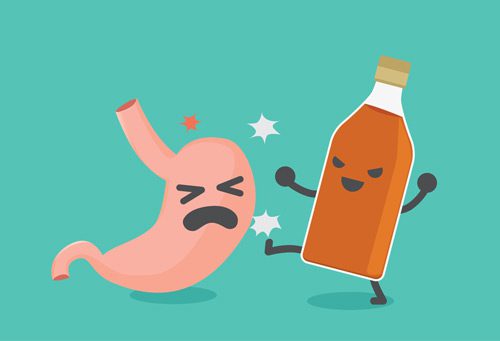Alcohol is a psychoactive toxic drug that can cause dependence and addiction. This mind-altering substance is a routine part of many people’s lives. Heavy drinking and binge drinking can increase a person’s risk of serious health problems. The damaging effects of alcohol can be long-lasting, extensive, and even life-threatening.
How Does the Body Process Alcohol?
When a person drinks alcohol, approximately 20 percent of it is rapidly absorbed through the stomach into the bloodstream. The small intestines absorb the other 80 percent. Any alcohol not absorbed is eliminated through sweat, saliva, and urine. When the alcohol reaches the bloodstream, the liver produces enzymes to break down the alcohol molecules.
Ethanol is the toxin in alcohol that causes intoxication. The body can only process a small amount of ethanol at a time, approximately the amount in one drink per hour. When an individual has more than one drink per hour, the liver cannot process the ethanol, which causes the person to feel intoxicated. Another compound in alcohol is acetaldehyde. It is a harmful, carcinogenic substance that causes damage to the body when ethanol is processed.
Effects of Alcohol & Liver Damage
Since the liver is the main organ that metabolizes alcohol, it suffers when a person is a heavy or long-term drinker. Liver disease progresses in three stages.
- Alcoholic fatty liver: In this stage of the disease, the liver is inflamed, but there are usually no symptoms. It is estimated that fatty liver disease will develop in more than 90 percent of heavy drinkers. At this stage, it is possible to reverse the damage if the individual stops drinking.
- Alcoholic hepatitis: When a person has alcoholic hepatitis, the liver is more seriously inflamed, and there is more damage. They may experience symptoms such as abdominal tenderness, jaundice, nausea, vomiting, fatigue, fever, and unintentional weight loss. At this stage, damage can be reduced, and the disease progression reversed if the person stops drinking.
- Cirrhosis: The last stage of the disease, cirrhosis of the liver, is critical. At this stage, there has been so much damage to the liver that scar tissue develops when it tries to heal. Cirrhosis cannot be reversed, but it can, if found in time, be treated. This stage can be fatal as the scar tissue stops the liver from functioning normally. If a person stops drinking, they can slow the progression of liver damage.
Additional Long-Term Health Risks & the Effects of Alcohol
Alcohol impacts all of the body’s organs and systems, especially the liver, heart, and brain. The following are some of the dangerous and damaging effects that excessive or binge drinking has on the body.
- Damage to the heart and circulatory system may cause the following: heart attack, stroke, arrhythmias, cardiomyopathy, heart failure, heart disease, heart muscle cell poisoning, and high blood pressure.
- Damage to the brain and central nervous system may include changes in a person’s behavior and mood as communication throughout the brain and body slows. It affects their thinking, balance, speech, vision, and coordination. It also affects their memory, judgment, impulses, voluntary movement, and emotional expression. The individual has an increased risk of dementia.
- Damage to the immune system weakens it, putting the individual at a higher risk of contracting pneumonia, infections, and other illnesses.
- Damage to the digestive system can occur quickly. Alcohol may cause malnutrition since the intestines cannot absorb nutrients and control bacteria. It also may cause tooth decay, gum disease, salivary gland damage, heartburn, acid reflux, esophageal ulcers, stomach ulcers, internal bleeding, internal bleeding, gastritis, and hemorrhoids.
- Damage to the skeletal system slows the growth of new bone development. The slowed bone growth increases the risk of bone fractures and osteoporosis. It also causes muscles to be more likely to cramp, weaken, or atrophy.
- Damage to the reproductive system causes erectile dysfunction and infertility in men. In women, it may cause infertility and the cessation of menstruation.
- Damage to the excretory system includes damage to the liver. It may also cause inflammation or disease of the pancreas, bladder, kidneys, and prostate.
There is an increased risk of certain kinds of cancer, including oral cavity, head, neck, pharynx, larynx, esophageal, liver, breast, and colorectal. - Alcohol poisoning can result in physical or mental impairment, life-threatening medical side effects, and even death.
Do You Need Help?
If you or a loved one struggles with alcohol or drug addiction, help is available. You are not alone. At Canyon Vista Recovery Center, located in Mesa, Arizona, our staff of highly skilled professionals will provide you with the help you need to live a sober life. Take the first step on the road to recovery. Call us today.










